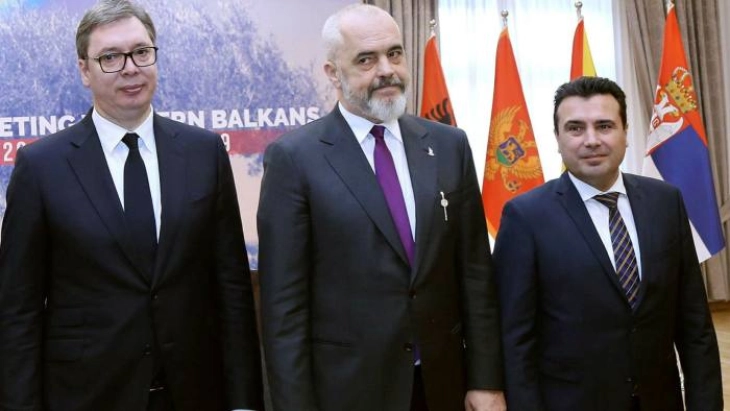Financial Times: Balkan trio push ‘mini-Schengen’ as they hit out at EU membership delay

London, 29 July 2021 (MIA) - Serbia, Albania and North Macedonia are set to launch their own border-free travel and business zone amid frustration with Brussels, London-based newspaper Financial Times wrote in an analysis dedicated to the Economic Forum on Regional Cooperation taking place in Skopje on Thursday.
“The leaders of Serbia, Albania and North Macedonia have hit out at Brussels over the slow pace of EU enlargement, vowing to press ahead with their own border-free travel and business zone as they wait for the bloc to admit them,” it added.
Financial Times underlined that Zoran Zaev, prime minister of North Macedonia, expressed frustration that “the EU does not deliver” on its promises, adding: “We need to accelerate practical benefits to our citizens.”
The newspaper also reported that Serbia’s president Alexander Vucic said in the interview that the region knows “there’s enlargement fatigue in the EU,” as well as the position of Albanian prime minister Edi Rama, who compared working with Brussels to Samuel Beckett’s existentialist play Waiting for Godot, in which two men engage in a series of often absurd conversations as they anticipate the arrival of someone who never comes.
The Balkan “mini-Schengen” travel and business zone modelled on the EU free-travel arrangement will be officially unveiled on Thursday, read the Financial Times’ article, adding that it will include a gradual easing of travel restrictions, faster “green lanes” at borders, reduced waiting times for freight and easier access to work permits.
It is hoped the zone, which said should come into being before the end of the year, will eventually include Montenegro and Bosnia and Herzegovina, while it also remains open to disputed-status Kosovo, the analysis noted.
Financial Times underlined that the Serbian leader said the Balkan region could no longer wait for the EU to unify it, having grappled with ethnic and religious conflicts and economic underachievement since the former Yugoslavia broke apart after 1991, adding that “when people have bigger salaries . . . they will think about better lives and not shadows from the past.”
“The countries have significant progress to make before the EU accepts them, such as electoral, judicial and economic reforms, but they also feel the official path has become too cumbersome. The aim of the mini-Schengen zone was to change the region’s narrative, both internally, to ease ethnic tensions, and externally, to appeal for EU membership and more investment,” Vucic said.
The newspaper stressed that North Macedonia changed its name to respect the sensitivities of EU member Greece, but he said Brussels had “failed” the region. North Macedonia, it added, was admitted to NATO last year, shortly after the name change, but the EU has yet to open accession talks with the country.
“The final goal is to be a member country of the EU,” FT reported Zaev saying. “But until the EU decides . . . we need to find ways to . . . continue the process of Europeanisation.”
The London-based publication wrote that the European Commission, which leads the process of evaluating progress towards EU membership, said that it supported efforts to integrate all six western Balkan nations in a common regional market, mirroring the EU’s single market and applying the bloc’s rules and standards. “The ultimate goal, EU accession, has not changed,” a commission spokesperson said.
Financial Times added that Albania and North Macedonia should have started EU membership talks last year, but that step is still being blocked by Bulgaria.
Even if negotiations start, read the article, political appetite for EU enlargement is very low in the bloc’s powerhouses, especially as German chancellor Angela Merkel — a supporter of Balkan integration — is stepping down after elections in September. All three Balkan leaders noted that while they waited on the EU, the US had given full support for their efforts.
“The Balkans that we have today may be the most shining — if not the only shining — example of American foreign policy,” FT quoted Rama saying. “The freedoms we enjoy today in the Balkans . . . is first and foremost their baby.”
Analysts, Financial Times wrote, also warned that as time passed — North Macedonia, and before that Macedonia, has been an EU candidate for 18 years, Serbia for nine and Albania for seven — the attraction of other potential partners could grow.
“Beside China and Russia, Turkey and the United Arab Emirates are also active in the region,” said Ivan Vejvoda, a fellow at the Institute for Human Sciences in Vienna. This should make “the EU aware that it left space for these countries to come in and it needs to get its act together”, he added.







